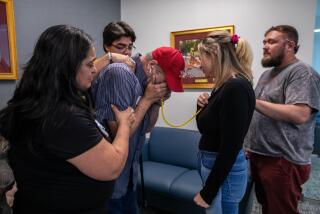‘Death Benefit’: Way to Boost Donations?
- Share via
Should families be paid for donating a loved one’s organs?
That question has generated a heated debate as transplant experts look for ways to increase the too-small pool of organ donors.
In a commentary last month in the Journal of the American Medical Assn., a Florida transplant coordinator called for consideration of a $1,000 “death benefit” for next of kin.
According to Dr. Thomas G. Peters, altruism alone isn’t working. And other efforts to increase the number of donors have failed.
“Public awareness programs, professional education and legislation have not increased organ donation,” he says in his commentary.
The benefit would be paid through an organ procurement organization, which then would be reimbursed by the recipient for that and any other costs to obtain the organ--such as transportation or surgeon fees.
The additional $1,000, says Peters, would not add significantly to the recipient’s overall costs, which can reach $250,000 in some cases, and would help promote more cost-saving efficiency within organ procurement organizations because more organs would be available.
Laws preventing the buying and selling of organs would remain in effect, and the death benefit amount would remain constant, he says, thus preventing the selling of organs to the highest bidder. Peters says that a payment system would not affect how organs are allocated; the person who needs the organ the most would still receive it if he or she meets all medical criteria for a good match.
He suggests a pilot payment program to see if it increases organ donations. The payment might motivate families that would turn down donation requests, he says, adding: “A death benefit payment may also foster the belief that society dealt fairly with the family in this matter.”
Others disagree.
In an accompanying commentary, Dr. Edmund D. Pellegrino of the Center for the Advanced Study of Ethics at Georgetown University calls the idea “morally dubious and destructive.”
He says families motivated by money might overlook the wishes of the deceased not to have organs donated. And poor families might face greater manipulation than more financially secure people.
Pellegrino says a payment program would also raise the question of whether a potential donor could receive the money before death.
Finally, he says, a death benefit would eliminate altruism: “Frustrating as the effort may be, we cannot abandon the effort to increase the supply of organs by education and appeals to altruism.”
Other transplant and organ procurement experts around the country are less opposed to the idea.
“I think it is something that should be tried on an experimental basis,” says Dr. Hallel Laks of UCLA’s heart and lung transplant program. “I think ethicists and lay people should explore the issue.
“I think one has to be very careful that one is not buying organs from the family. But it if is a uniform and well-regulated incentive, I think it could be useful.”
Representatives of the Transplant Recipients International Organization also have called for an evaluation of the payment idea.
“Everyone is calling for creative solutions” to increase organ donations, says Veronia Meury, executive director of TRIO. “We would like to see all things explored.”
Barbara Schulman, senior transplant coordinator of the Regional Organ Procurement Agency at UCLA, also supports a pilot program to test the concept.
“I’m for anything that’s legal and is sound and dignified to see if it would work,” she says.
But Schulman does worry that a payment system might offend some would-be donors: “Usually the donor families are not comfortable with financial reward. Families often ask us if anyone is making money on this. When we describe this as a nonprofit effort, that seems to help.
“I think we may get another thousand donors who are interested, but what happens to the donors who do it for altruistic reasons?”






